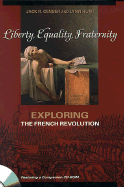Course Objectives
The most obvious goal of History 301 is to familiarize students with the principal developments in European history from the end of the Thirty Years' War (1648), through the age of absolutism and Enlightenment, to the French Revolution. More profoundly, its goal is to expose students to material conditions, social structures, political cultures that differ profoundly from their own. A common theme underlies these disparate topics. It concerns a transformation in the relationship between what was thought of as “public” and what was considered “private.” This distinction seems so clear and obvious to us—and yet it, like everything else in human affairs, is the product of specific historical processes. In its modern form, the distinction did not exist prior to the period examined in this course. Most people, for example, held little or no property that we would consider “private”—which is not to say they owned nothing. It is, rather, to suggest that the ownership of things was many-layered in ways it is no longer. This system of layered and divided ownership defined a whole host of social and economic relationships; abolishing its last vestiges was central to the agenda of revolution in France in 1789. Another example: those who exercised “public” authority were thought to embody that power is some fundamental way. The king of France did not simply rule over his kingdom; rather, he was France. To put it another way: his private and his public person were one and the same. Similarly, when the delegates of a kingdom or a province assembled in one place, they did not simply function as delegated representatives of their electors; rather, the delegates assembled together as a collectivity embodied the realm. In this sense they did not “represent” the realm; they were the realm itself. This concept of representation, too, the French Revolution sought to abolish.
This course assumes little or no familiarity with European history. There are no prerequisites, though expectations are higher than in the introductory courses, such as Western Civilization sequence (HIST 101-103). It is the first segment of a year-long, three-term survey of modern European history (301-303). And while I hope that students who take this course will continue with HIST 302 and 303, HIST 301 is designed to stand on its own.
Requirements for this course are the following. Attendance is required: a sign-up sheet will be distributed at each session; you will also be evaluated for the frequency and quality of your contribution to discussions of the readings in class. Together, attendance and participation will comprise ten percent (10%) of your grade.
There will be two examinations: 1) a midterm, in class, on Thursday, October 20; and 2) a two-hour comprehensive final examination at a time to be determined by the Office of the Registrar. These examinations will test your comprehension of the arguments and interpretations put forward in lectures, your understanding of the course readings, and of course your command of the main events and basic facts covered by this survey.
There will also be two papers, each at least 1,000 words in length, which will also be based on course readings. The first will be due in class and by electronic deposit in Canvas on Thursday, November 10; the second essay will be due in class on Tuesday, November 29. All papers must be delivered in two forms -- physically, as a paper print-out, for the purposes of grading and mark-up; and electronically, so that they can be vetted for plagiarism (see below).
Note also that there will be no class meeting on Thursday, November 24 (Thanksgiving).
The breakdown of your final grade will be as follows:
Attendance & Participation: 10%
Midterm: 20%
Two papers: 20% each
Final: 30%A note on minimum requirements: each of the examinations and paper assignments is a minumum requirement, which is to say that a student cannot pass this course unless she/he has successfully completed each and all of the minimum required assignments, both the written assignments as well as the examinations. A student who fails to deliver one of the papers, or who does not take one of the exams, has not met the minimum requirements for the course, and therefore will receive a grade of “F” for the entire course.
A note on plagiarism, repurposing, fabrication, and cheating: the policy for this course is simple.
1) First, all written work must be submitted in two forms: (i) a paper print-out, in order to make facilitate grading; and (ii) electronically, by depositing your work in Canvas.
2) Second, all work presented in this course must be produced exclusively for this course, i.e., it is not acceptable to “repurpose” papers written for other courses.
3) Finally, all written work must be submitted in full and on time; late work will be accepted only with documented and independently verifiable medical justification.Anyone who cheats on an exam or who turns in work for credit that is repurposed or plagiarized or that is not substantially his/her own will receive an “F” for the assignment, and because each assignment is a minimum requirement for the entire course, a failing grade on the written assignment will result in a failing grade for the entire course. Students suspected of plagiarism or cheating will also be reported to the Office of Student Conduct and Community Standards, the university agency responsible for adjudicating cases of academic dishonesty. The ultimate penalty for plagiarism is expulsion from the university. If you have any doubt about the meaning of academic dishonesty, please refer to the university's standard definitions. You can also find useful information on avoiding academic dishonesty at the University Library.
If you have a documented disability and anticipate needing accommodations in this course, please make arrangements with me soon. If you are in doubt regarding the requirements for this course, please do not hesitate to consult me: dluebke@uoregon.edu.
Image right: Jan Havickszoon Steen (ca.1625-1679), The Schoolmaster (1663-1665). Image source: CGFA.
Most days, sessions will be divided between lecture and discussion of assigned readings. It is therefore incumbent on students to prepare the readings in advance of the session to which it is assigned and to discuss the reading in class. The writing assignments will be based on the assigned readings, and the two examinations will also evaluate your knowledge of the assigned texts, so it is in your best interest to stay on top of the reading and take careful notes on what you find in them. The majority of these texts will be made available through Blackboard.
In addition, there will be two textbooks used in this course: (1) Raymond Birn, Crisis, Absolutism, Revolution: Europe and the World, 1648-1789, and (2) Jack Censer and Lynn Hunt, Liberty, Equality, Fraternity: Exploring the French Revolution. Birn's text provides an in-depth analysis and narrative of European history from the end of the Thirty Years' War through to the outbreak of the French Revolution; as such, it is extremely valuable as a source of information more detailed than any lecture can be, as a reference book for information on key persons and events in the period, and finally as a tool for exam preparation. Likewise Censer & Hunt provide analysis and narrative for the final segment of this course, which covers the era of the French Revolution. It also contains primary documents, some of which we will be discussing in class, and on which students will base their second papers.

